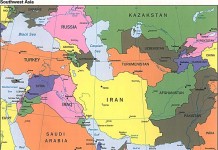Context
 According to media reports Commander of Royal Saudi Land Forces Lieutenant General Abdul Rahman Bin Abdullah Al-Murshid visited General Headquarters (GHQ) and met Pakistan’s Chief of Army Staff General Ashfaq Kayani on March 9. Saudi General also visited with General Khalid Shameem Wynne, Chairman Joint Chiefs of Staff Committee (CJCSC), at the Joint Staff Headquarters in Chaklala. This article examines the significance of the visit as Middle East and increasingly Saudi Arabia, faces civil unrest. Additionally, the article looks at the past and future role of Pakistan’s armed force in the Arab world, and it’s political and economic implications.
According to media reports Commander of Royal Saudi Land Forces Lieutenant General Abdul Rahman Bin Abdullah Al-Murshid visited General Headquarters (GHQ) and met Pakistan’s Chief of Army Staff General Ashfaq Kayani on March 9. Saudi General also visited with General Khalid Shameem Wynne, Chairman Joint Chiefs of Staff Committee (CJCSC), at the Joint Staff Headquarters in Chaklala. This article examines the significance of the visit as Middle East and increasingly Saudi Arabia, faces civil unrest. Additionally, the article looks at the past and future role of Pakistan’s armed force in the Arab world, and it’s political and economic implications.
Analysis
Pakistan Army’s information wing ISPR (Inter Services Public Relations) released the following statement after the meeting,
“He was also given briefings on various professional issues. The visit signifies the unique and brotherly relations enjoyed by the people and Armed Forces of both the countries.”
Additionally, according to ISPR discussions also took place on the evolving geostrategic environment, to include other professional matters.
Lieutenant General Abdul Rahman’s visit to Pakistan has taken place as public protests have spread in Middle East and there are fears that unrest in Bahrain and Yemen could engulf Saudi Arabia as well. A Day of Rage called for March 11 in the Kingdom, has so far been unable to spur the kind of disturbances seen in Egypt, Tunisia, and other Arab countries.
PoliTact as previously examined the role Pakistan’s armed forces in conflicts in Middle East, they are listed below:
- In 1969, training personnel from Pakistan armed forces helped beat back attack from South Yemen on Sharoora province of Saudi Arabia. South Yemen at the time was under a communist regime, strongly supported by USSR.
- During the Six Day War (1967) and Yom Kippur War (1973), pilots from Pakistan’s air force were involved in helping Jordan, Syria, and Egypt in conflict with Israel. Military advisers and trainers were also helping the armed forces of these countries.
- King Hussein of Jordan used Pakistan’s training mission under Brigadier Zia-ul-Haq to suppress the Palestinian uprising in the 70s.
- More recently, during the Gulf War of 1990, Pakistani forces were deployed along the Saudi-Yemen border, as coalition forces expelling Iraqi forces from Kuwait.
- In 2006, President Musharraf sent a contingent of Army personnel to Lebanon for demining areas bombed by Israel.
PoliTact also evaluated the prospect of Pakistan army deploying to the Kingdom, if requested. Such a request would put Pakistan in a daunting bind: to support either the royal family or the wishes of the people. The circumstances currently existing on Pakistan’s eastern and western flank would make the possibility of assisting other nations of the Gulf region unlikely.
In the recent past, Egyptian military has also been assisting in training Saudi forces. However, due to the continuing unrest in Egypt, it’s unclear what role it would be able to play in the Kingdom. However, if the strife starts to take the Shiite-Sunni line, there is increasing likelihood of the forces from Sunni countries to get involved in the Kingdom. Consequently, this action could lead Iran to counteract in Afghanistan and FATA.
If not directly, retired personnel from Pakistan army could get involved in Middle East. According to a report in Pakistan’s The Tribune Express today, Overseas Employment Service of the Fauji Foundation is recruiting ex-military personnel to serve in Bahrain’s National Guard. The Fauji Foundation was established as a trust for ex-servicemen and their families in 1954 and is run by retired personnel from Pakistan’s armed forces. This trend could easily spread to Saudi Arabia and other Middle Eastern countries and become a major source of foreign income. Pakistan’s military is highly regarded in the Middle East, and particularly after the country become a declared nuclear power.



